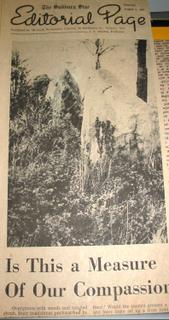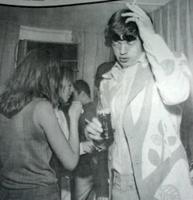In retrospect, joining the Sudbury Star news staff in the middle of winter was probably not the best move for this Toronto-born-and-raised southerner.
It was cold enough in this Northern Ontario city to freeze my beard, stall my car and make weekend escapes to Toronto quite hazardous.
But there was something different about this Thomson daily newspaper. It appeared to be autonomous, free from Thomson budget restraints and newspaper layout guidelines.
The Sudbury Star did not feel, look or act like any other Thomson newspaper and that was a bonus. Perhaps it was compensation for having to live and work in Sudbury.
 George Grace
George Grace, city editor, reporters
Brian Gagnon,
Don DeGurse and others helped me fit in quickly and within a couple of weeks, Grace assigned me to the court beat, which included a weekly Court Beat column.
On quiet court days, assignments would include police calls. Vividly remember standing in snow with a frozen camera waiting for a murder victim to be removed in a body bag. Frostbite was threatening my toes. Spring could not arrive fast enough.
Sudbury being a mining town, one story the Star wouldn't publish was a negative study that concluded Sudbury had a higher than average number of lost dogs because chemicals in the air dulled their sense of smell.
The place for news staff to be after working hours was the Nickel Range Hotel. It had a lounge, where the occasional Toronto band -
Crowbar for one - would perform. And it had a beer room, where the father of Sudbury-born
Alex Trebek often held court proudly talking about his son the TV star.
In the summer of 1968, Grace asked me if I would run the Espanola Standard while the sister-paper's publisher was on vacation. He didn't have to ask twice. Accommodations were in the Espanola Hotel and meals were included in my first-ever expense account.
Maybe it was my Thomson training, where you had to see daylight through carbon paper to get a new sheet, and paper clips were used sparingly, but I never abused the luxury of having an expense account. Was always as frugal as a Thomson-trained accountant.

My favourite story while in Espanola was the discovery a small cemetery for three, possibly four, German prisoners of war that had been abandoned and overgrown with weeds and bushes. The markers had been damaged by shotgun pellets. It was a pathetic sight.
J.R. Meakes, the Sudbury Star publisher, followed up on my story with a photograph atop a lengthy editorial and a headline reading "Is This a Measure Of Our Compassion?"
The editorial said, in part: "It is a disgraceful contrast to the carefully tended, neat plots of the Allied war cemeteries in Europe, including Germany. Even isolated graves of our servicemen who died in action or as prisoners are well care for through arrangements made by the Commonwealth War Graves Commission with the West German or other governments."
The story and editorial shamed Espanola officials into clearing the weeds and bushes and repairing damaged headstones. Always wondered if the upkeep continued. Probably not, but always felt good about the story, the editorial and the outcome.
One of the more exciting political assignments was covering a Pierre Trudeau election campaign speech in Sudbury in 1968. Turdeaumania was peaking and it appeared certain he was destined to become the next prime minister that fall.
As a sidebar to the campaign stop colour story, decided to test the security detail by running up eight flights of stairs at Trudeau's hotel after his speech and opening the door to his floor. Trudeau, flanked by two constables, were walking a few feet away with their backs toward me.
One constable turned around, looked startled, and then noticed the camera slung over my shoulder and my Sudbury Star press tag. The constable who approached me was not amused. Trudeau casually kept walking toward his room after glancing back briefly.
Speaking of Sudbury police, marijuana in the late 1960's wasn't tolerated in Northern Ontario and someone in our non-media circle of friends was arrested for possession of a small amount of pot. His sentence was 18 months in reformatory. He was devastated, as were family and friends.
The weather and isolation aside, working at the Sudbury Star was great experience, nine months well spent in personal and professional growth. But the time had come to follow another dream - working as a reporter in Vancouver.
In the two months before quitting the Sudbury Star, numerous letters were sent to British Columbia newspapers seeking employment. Most of the replies repeated a common thread: newspaper jobs in B.C. were going to local applicants.
So in the fall of 1968, with one payment to go on my 1965 Chevy, a few hundred dollars in my pocket, and no job, filled my car with belongings, said farewell to family and friends, and headed west full of anticipation and confidence.
The trans-Canada journey was eventful, with a job offer from the Winnipeg Free Press during a stop at the local press club, a near-collision with a huge moose, a minor car breakdown and a hair-raising first drive through the Rockies.
Reached Vancouver with enough money for a week's stay at a one-star hotel, where hookers came and went all hours of the day. Moved into a comfortable rooming house a week later.
Press clubs have all but vanished in Canada, but in the fall of 1968, the posh Vancouver Press Club in the Georgia Hotel was a prosperous watering hole for thirsty media types. It was a chance conversation at the press club that got me my first job in B.C.
Not at all what I expected, but it was a job.
Next blog: Powell River News - darkroom technician 






